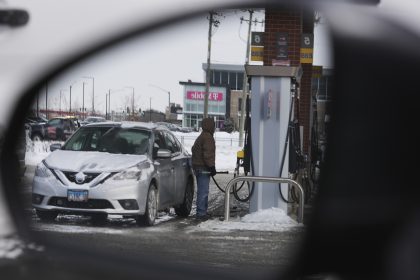Retail Sales Plunge a Historic 8.7% After Pandemic Takes Hold

WASHINGTON — Despite the widespread hoarding of toilet paper, hand sanitizer and other items that continue to leave many store shelves bare, U.S. retail sales plunged 8.7% in March, an unprecedented decline, the Commerce Department reported Wednesday.
The deceleration of sales far outpaces the previous record decline of 3.9% that took place during the depths of the Great Recession in November 2008, the department said.
Overall, clothing store sales took the biggest hit, declining 50.5%, while restaurants and bars saw a decline in sales of 27% and auto sales dropped 25.6%.
Meanwhile, grocery store sales jumped by nearly 26% as Americans stocked up on food and consumer goods to ride out the pandemic.
Consumer spending drives two-thirds of the U.S. economy, and the record drop in retail sales is a symptom of the sharp recession that most economists believe the U.S. has already entered.
The pandemic is seen as being particularly tough on brick and mortar retailers, who were already taking it on the chin from online retailers.
With a nationwide shutdown of malls and most stores, the coronavirus outbreak and government orders to stay at home and practice social distancing is putting many clothing retailers in peril.
More than 250,000 stores, including Macy’s, Nordstrom and Nike, which sell non-essential merchandise have been shuttered since mid-March and have furloughed hundreds of thousands of workers.
Some retailers, notably The Gap and Ralph Lauren, have also announced they have temporarily stopped ordering products for the fall.
According to Sourcing Journal, a trade publication, the Gap sent an email to vendors that said in part,”stores are the lifeblood of our business and while we are still operating our e-commerce channels, they simply cannot make up for having our stores closed.”
“As much as we want to minimize the impacts to our supply chain, the situation is fluid and we need to remain responsive,” the email reportedly said.
Wednesday’s report wasn’t all bad news for brick and mortar stores, however, big box retailers that sell essentials like food and household goods actually saw their sales rise.
But no one appears to be doing as well presently as Amazon and Walmart, who have both ramped up hiring to meet demand for home delivery of products.
Last week, Fitch Ratings said it expects discretionary spending by shoppers to decline by as much as 40%-50% in the first half of 2020.
In addition the ratings company downgraded a number of department store and specialty retailers last week with ratings on four retailers, Macy’s, Tapestry, Capri, and Dillard’s, being lowered to non-investment grade.
“We project retail discretionary spending will decline 40%-50% in the first half of 2020, with a slow rate of improvement expected through the summer from a current 80%-90% decline in sales if stores start to open mid-May or early June,” Fitch ratings said.
“Given an increased likelihood of a consumer downturn, we are forecasting sales to be down mid-to-high single digits in the second half of 2020 and sales in 2021 to decline 8%-10% from 2019 levels,” it said. “Sales declines for the secularly challenged department stores are expected to be more material on a relative basis. Revenue trends could improve exiting 2021, given the typical four to six quarter duration of a consumer downturn, resulting in 2022 being a growth year.”























